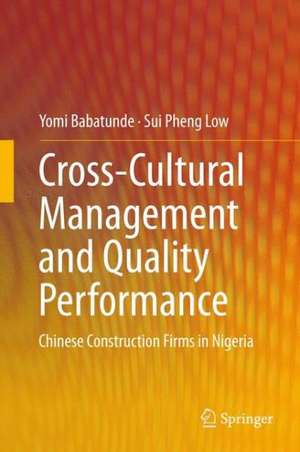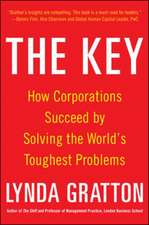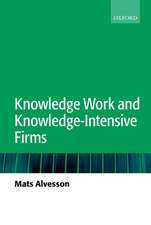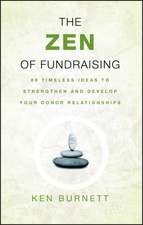Cross-Cultural Management and Quality Performance: Chinese Construction Firms in Nigeria
Autor Yomi Babatunde, Sui Pheng Lowen Limba Engleză Hardback – 27 ian 2015
| Toate formatele și edițiile | Preț | Express |
|---|---|---|
| Paperback (1) | 649.54 lei 6-8 săpt. | |
| Springer Nature Singapore – 9 oct 2016 | 649.54 lei 6-8 săpt. | |
| Hardback (1) | 655.92 lei 6-8 săpt. | |
| Springer Nature Singapore – 27 ian 2015 | 655.92 lei 6-8 săpt. |
Preț: 655.92 lei
Preț vechi: 771.68 lei
-15% Nou
Puncte Express: 984
Preț estimativ în valută:
125.52€ • 130.88$ • 104.32£
125.52€ • 130.88$ • 104.32£
Carte tipărită la comandă
Livrare economică 21 martie-04 aprilie
Preluare comenzi: 021 569.72.76
Specificații
ISBN-13: 9789812873613
ISBN-10: 9812873619
Pagini: 450
Ilustrații: XIX, 462 p. 30 illus., 8 illus. in color.
Dimensiuni: 155 x 235 x 32 mm
Greutate: 0.85 kg
Ediția:2015
Editura: Springer Nature Singapore
Colecția Springer
Locul publicării:Singapore, Singapore
ISBN-10: 9812873619
Pagini: 450
Ilustrații: XIX, 462 p. 30 illus., 8 illus. in color.
Dimensiuni: 155 x 235 x 32 mm
Greutate: 0.85 kg
Ediția:2015
Editura: Springer Nature Singapore
Colecția Springer
Locul publicării:Singapore, Singapore
Public țintă
ResearchCuprins
Introduction.- TQM and National Culture.- Construction Industry in China.- Construction Industry in Nigeria.- Relationship Between the Chinese and Nigerian Construction Industries.- Conceptual Approach.- Research Design and Method.- Results and Discussions.- Summary and Conclusions.
Notă biografică
Dr. Yomi Babatunde is a Lecturer at the School of Construction Economics & Management, University of the Witwatersrand where he teaches Project Management. His research interests are in the areas of international project management, total quality management, and cross‐cultural management. He holds PhD and MSc (Project Management) degrees from the Department of Building, National University of Singapore. He also holds MArch and BSc (Hons) (Architecture) degrees from the Department of Architecture, Obafemi Awolowo University in Nigeria.
Dr. Low Sui Pheng is presently Professor of Building in the School of Design and Environment, National University of Singapore where he has previously served as Head and Vice‐Dean. He teaches construction project management and has published, researched and consulted extensively both in Singapore and\ overseas. A Fellow of the Chartered Institute of Building, he holds a DSc degree from the University of Birmingham and a PhD degree from University College London. He currently serves as Director for the Centre for Project Management and Construction Law.
Dr. Low Sui Pheng is presently Professor of Building in the School of Design and Environment, National University of Singapore where he has previously served as Head and Vice‐Dean. He teaches construction project management and has published, researched and consulted extensively both in Singapore and\ overseas. A Fellow of the Chartered Institute of Building, he holds a DSc degree from the University of Birmingham and a PhD degree from University College London. He currently serves as Director for the Centre for Project Management and Construction Law.
Textul de pe ultima copertă
This book explores China’s global competitiveness in the building of infrastructures with a particular interest in the resource-rich African countries. The book begins with a comprehensive literature review on total quality management (TQM) and national culture, followed by reviews of the construction industries in China and Nigeria. This provides better understanding of the linkages between TQM, based on the International Organization for Standardization’s ISO 9000 quality management systems (QMS), and national culture, based on Emeritus Professor Geert Hofstede’s national cultural dimensions. Premised on the culture-specificity and bi-directionality relationships between TQM and national culture, this book investigates the construction industries in China and Nigeria including their strengths, weaknesses, opportunities, and threats (SWOT) as well as an appraisal of their historical and emerging relationships. In its conceptual approach, this book presents different models in the lead up to its primary theoretical contribution of a quality management assessment model (QMAM) that was adopted during the study’s field work. The book also presents relevant lessons relating to cross cultural management and quality performance not only to the Nigerians but also other foreign players in Nigeria’s construction industry.
Caracteristici
Highlights the construction service quality performance of Chinese construction firms in Nigeria, a developing African economy Investigates the effect of cultural differences between the Chinese construction firms and Nigeria host country on the implementation total quality management (ISO 9000) Proposes an approach to minimize conflicts during TQM implementation for international construction and project management Includes supplementary material: sn.pub/extras
















